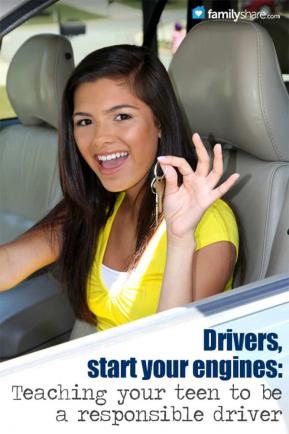
According to the California Department of Motor Vehicles, "For both men and women, drivers aged 16 to 19 years of age have the highest average annual crash and traffic violation rates of any other age group."� Shortly after receiving my own driver's license, I became one of those statistics. From my own experiences and as the mother of three teenage drivers, I have learned some important lessons about helping teens become safe and responsible in the car.
For the parent
Require responsibility before handing over the keys to your teenager
Insist that she pay for gas or insurance and certainly for traffic tickets. Require her to help with carpooling and errands and to keep the car clean and well maintained.
Create a driving contract
This agreement details your expectations, safety rules and consequences for breaking the rules. For an example of a driving contract, go to teendriving.com.
Choose a safe car with advanced safety features
Also make sure the vehicle has good crash-test results. Consumer Reports provides a list of vehicles they have tested and feel are appropriate for young drivers.
Know the rules for driving
With fewer schools providing Driver's Education classes and online courses becoming available, more responsibility is on parents to teach their children how to drive. The DMV in most states has a manual for new drivers that lists traffic rules, safe driving procedures and tips for teaching a new driver.
Purchase good car insurance
Also, educate your child about your insurance policy.
Model good driving yourself
Put on your seat belt and put away your cell phone. Obey the traffic laws, show respect for other drivers and talk to your teen about various driving scenarios when you are together in the car.
Respect your child's abilities and wishes
Each child is different and will need to go at his own pace when learning how to drive. Be patient and loving when he makes a mistake. Build his confidence by giving compliments and manageable expectations.
For the teenager
No cell phone usage
U.S. researchers report that "maneuvering through traffic while talking on the phone increases the likelihood of an accident five-fold and is actually more dangerous than driving drunk."� Many states prohibit the use of cell phones when driving, and teenagers particularly need to stay off the phone when on the road.
Minimize distractions
Avoid eating, drinking, applying make-up and even adjusting the radio whenever possible. Accidents follow in the wake of such distractions, especially for inexperienced drivers.
Follow the speed limit
According to dmv.org, "speeding causes about 40% of all fatal teen accidents."� Play it safe by abiding by the speed limit.
Practice defensive driving
Be aware of the drivers around you and allow proper distance between your car and the car in front of you. Check your mirrors often and stay away from erratic drivers.
Follow state laws concerning driving with other teenagers when newly licensed
Even after you are legally allowed to carry passengers, use good judgment about who and how many you take with you.
Take the driving course
Even when not required for good insurance rates, take a driver's course and take it seriously.
Avoid driving when overly tired or in a hurry
Be wise about driving at night and be patient when driving. Take your time to reach your destination.
Always keep the gas tank half full or above
You never know when you might be in a traffic jam or a situation where gas is not readily available.
In bad weather, play it smart
Don't be afraid to pull over and wait it out, and certainly adjust your speed based on road conditions. Listen to traffic reports and make necessary adjustments in your travel plans.
Plan your route
Be sure to know where you are going beforehand. Blindly following a GPS can cause problems for new drivers.
Driving is an essential life skill in today's world. With proper instruction and appropriate expectations, teenagers and parents can have a positive driving experience.

